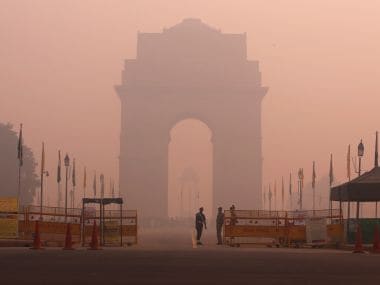New Delhi: The Supreme Court on Friday dismissed a plea seeking full statehood for Delhi saying it has become “infructuous” in view of the Constitution bench verdict which had held that Delhi cannot be accorded the status of a state. The matter came up for hearing before a bench comprising justices Madan B Lokur, S Abdul Nazeer and Deepak Gupta and the advocate appearing for the petitioner referred to the judgement delivered by a five-judge Constitution bench on 4 July. “It (petition) is infructuous,” the bench said while dismissing the plea. [caption id=“attachment_3081838” align=“alignleft” width=“380”]
 File image of India Gate at Delhi. PTI[/caption] The court was hearing a plea seeking to declare Article 239AA (which deals with powers and status of Delhi) of the Constitution and The Government of National Capital Territory of Delhi Act 1991 as “unconstitutional” on the ground that a territory of India has to be either a full state or a union territory. The plea had also alleged that constitutional arrangements for Delhi were responsible for the mismanagement in administration of the national capital which results in several problems including air pollution, traffic jams, water logging, unauthorised constructions. It claimed that these issues could be resolved by giving full statehood to Delhi. On 4 July, a Constitution bench of the top court had unanimously held that Delhi cannot be accorded the status of a state and had clipped the powers of the Lieutenant Governor saying he has no “independent decision making power” and has to act on the aid and advice of the elected government. The apex court had said that except for three issues — public order, police and land — the Delhi government has the power to legislate and govern on other issues. It had also held that there was no independent authority vested with the Lieutenant Governor to take independent decisions.
File image of India Gate at Delhi. PTI[/caption] The court was hearing a plea seeking to declare Article 239AA (which deals with powers and status of Delhi) of the Constitution and The Government of National Capital Territory of Delhi Act 1991 as “unconstitutional” on the ground that a territory of India has to be either a full state or a union territory. The plea had also alleged that constitutional arrangements for Delhi were responsible for the mismanagement in administration of the national capital which results in several problems including air pollution, traffic jams, water logging, unauthorised constructions. It claimed that these issues could be resolved by giving full statehood to Delhi. On 4 July, a Constitution bench of the top court had unanimously held that Delhi cannot be accorded the status of a state and had clipped the powers of the Lieutenant Governor saying he has no “independent decision making power” and has to act on the aid and advice of the elected government. The apex court had said that except for three issues — public order, police and land — the Delhi government has the power to legislate and govern on other issues. It had also held that there was no independent authority vested with the Lieutenant Governor to take independent decisions.
SC dismisses plea seeking full statehood for Delhi; says petition 'infructuous' due to 4 July ruling on same issue
Press Trust of India
• October 5, 2018, 19:27:58 IST
On 4 July, a Constitution bench of the top court had unanimously held that Delhi cannot be accorded the status of a state
Advertisement
)
End of Article